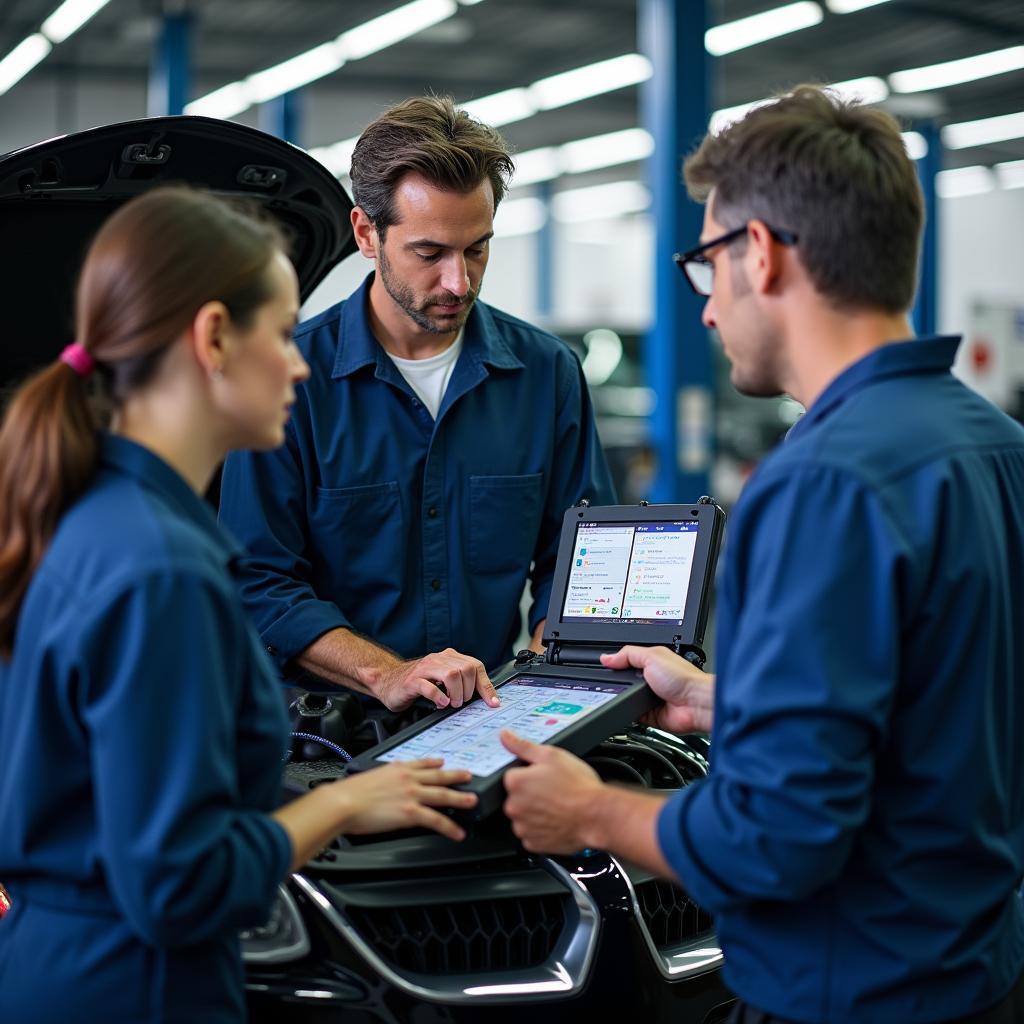The “Car Services Team Art” isn’t just about fixing cars; it’s a symphony of technical skill, diagnostic prowess, and customer service excellence. It’s the culmination of individual expertise blended seamlessly to deliver a superior experience for every vehicle owner. This article delves into the intricacies of building and managing a successful car service team, highlighting the key elements that contribute to a thriving business.
Building a High-Performing Car Service Team
A successful car service team requires a diverse skill set, ranging from seasoned mechanics with years of hands-on experience to tech-savvy diagnosticians capable of navigating the complexities of modern vehicle systems. Building this team requires careful planning and a strategic approach to recruitment and training.
- Technical Expertise: The core of any car service team is its technical proficiency. Mechanics must be adept at diagnosing and repairing a wide range of vehicles, possessing an in-depth understanding of mechanical, electrical, and electronic systems. Investing in continuous training and certifications is crucial to staying abreast of the latest automotive technologies.
- Diagnostic Abilities: Modern vehicles are increasingly reliant on sophisticated computer systems. This requires technicians to be proficient in using diagnostic tools and interpreting data to pinpoint issues accurately. Strong diagnostic skills are paramount to efficient and effective repairs.
- Customer Service Skills: Beyond technical expertise, exceptional customer service is essential. Clear communication, empathy, and a commitment to customer satisfaction are key to building trust and loyalty. A positive customer experience is just as crucial as a perfectly executed repair.
The Art of Team Dynamics in Car Services
A well-oiled car service team is more than the sum of its parts. Effective teamwork, communication, and a shared commitment to quality are crucial for achieving success.
- Collaboration and Communication: Open communication and seamless collaboration are essential for a smooth workflow. Technicians need to be able to share information effectively, discuss diagnoses, and coordinate repairs. This fosters a supportive environment where everyone contributes to the team’s overall success.
- Shared Vision and Goals: A unified vision and clearly defined goals are vital for motivating team members and driving performance. When everyone understands the team’s objectives and is working towards a common purpose, it creates a sense of shared ownership and accountability.
- Continuous Improvement: The automotive industry is constantly evolving. A successful car service team embraces continuous improvement, seeking new knowledge, adopting best practices, and adapting to technological advancements. This commitment to learning and growth ensures that the team stays ahead of the curve.
Leading and Managing a Car Service Team
Effective leadership is critical to cultivating a high-performing car service team. A strong leader sets the tone, fosters a positive work environment, and empowers team members to reach their full potential.
- Mentorship and Training: Investing in ongoing training and mentorship programs is essential for developing team members’ skills and fostering their growth within the organization. Providing opportunities for professional development not only enhances their expertise but also increases job satisfaction and retention.
- Performance Management: Implementing a robust performance management system helps track individual and team progress, identify areas for improvement, and recognize outstanding achievements. Regular feedback and constructive criticism are essential for continuous growth.
- Creating a Positive Work Environment: A positive and supportive work environment is crucial for attracting and retaining top talent. Fostering a culture of respect, collaboration, and open communication enhances team morale and productivity.
Conclusion
The “car services team art” is a dynamic interplay of technical expertise, teamwork, and leadership. By focusing on building a skilled and motivated team, fostering effective communication and collaboration, and embracing continuous improvement, car service businesses can achieve exceptional results and deliver a superior customer experience. Remember, the success of any car service operation rests on the shoulders of its dedicated team.
FAQ
- What are the key qualities of a successful car service technician?
- How can I improve communication within my car service team?
- What are some effective strategies for motivating car service technicians?
- How can I stay updated on the latest automotive technologies?
- What are the benefits of investing in training for my car service team?
- How can I create a positive work environment in my car service center?
- What are some best practices for managing a car service team?
Common Car Service Scenarios
- No-Start Diagnosis: When a car won’t start, the team uses diagnostic tools to check the battery, starter, alternator, and fuel system.
- Brake System Inspection: Routine brake inspections involve checking brake pads, rotors, calipers, and brake lines.
- Engine Performance Issues: Diagnosing engine problems requires analyzing data from the engine control unit and checking various components like spark plugs, fuel injectors, and sensors.
Further Exploration
Check out these related articles:
Need support? Contact us via WhatsApp: +1(641)206-8880, Email: [email protected]. We have a 24/7 customer support team.


